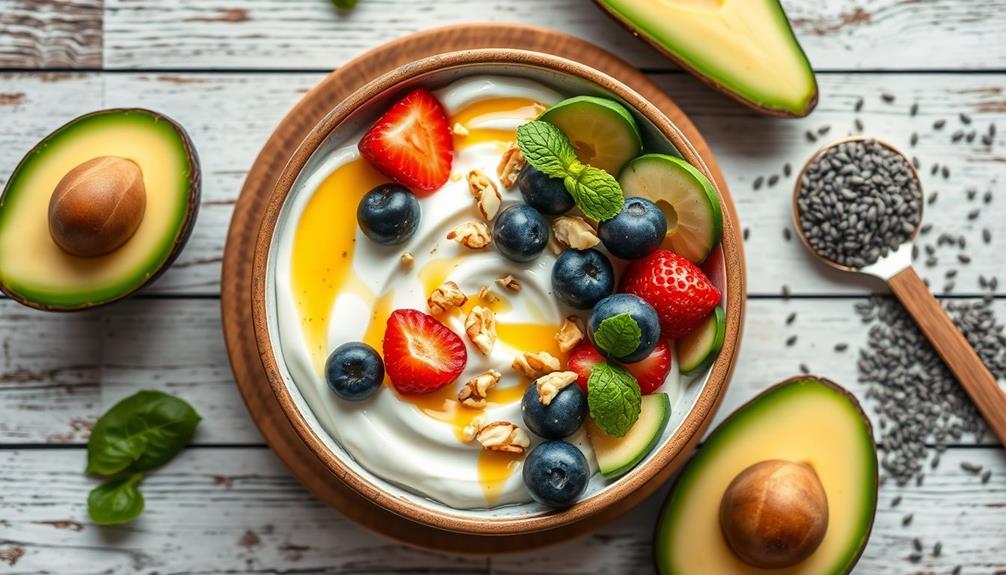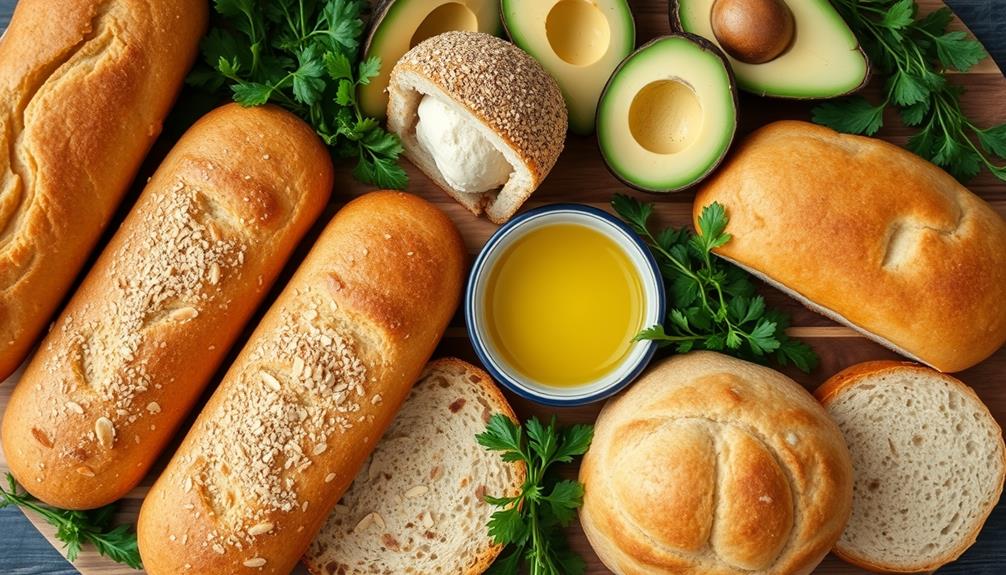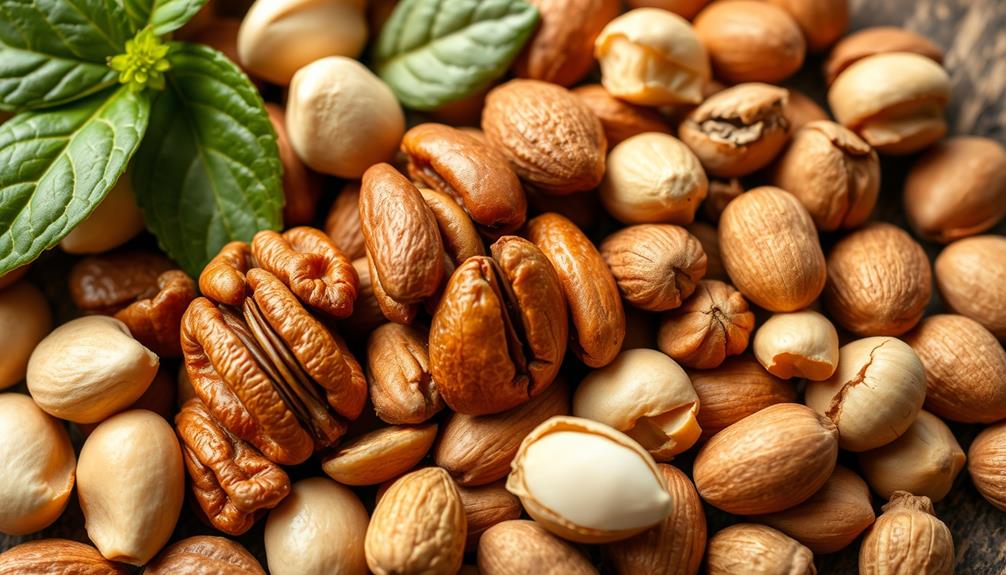Keto breakfast ideas with Greek yogurt are perfect for a creamy, filling, and low-carb start to your day. Opt for plain, full-fat Greek yogurt, which packs about 15 grams of protein and only 5 grams of carbs per serving. You can create delicious yogurt parfaits with low-carb berries like blueberries and strawberries, or mix in nuts and seeds for added healthy fats. Try recipes like chocolate strawberry bliss or cinnamon almond swirl for variety. This versatile ingredient fits perfectly into your keto lifestyle, and there's plenty more inspiration waiting for you. For an extra boost of creaminess, you can also blend your Greek yogurt with the **best ketofriendly milk options** like unsweetened almond milk or coconut milk for a smooth and satisfying texture. These low-carb milk alternatives are perfect for thinning out your yogurt or adding to smoothies, all while keeping your overall carb intake minimal. Experiment with different flavors and toppings to keep your keto breakfasts exciting and nutritious.
Key Takeaways
- Greek yogurt is a low-carb, high-protein option, making it ideal for filling keto breakfasts.
- Combine Greek yogurt with low-carb fruits like berries for added flavor and nutrients.
- Enhance your yogurt with healthy fats from nuts, seeds, or nut butters for satiety.
- Experiment with natural sweeteners and spices like cinnamon to elevate taste without extra carbs.
- Prepare simple recipes like Berry Nut Delight or Chocolate Strawberry Bliss for quick, satisfying breakfasts.
Benefits of Greek Yogurt on Keto

When it comes to sustaining a keto diet, the benefits of Greek yogurt are hard to overlook. As a low-carb option, it packs only about 5g of carbohydrates per 3/4 cup of full-fat Greek yogurt, making it an excellent choice to help you maintain ketosis.
You'll also love that it's high in protein, offering approximately 15g per serving. This protein content promotes satiety and supports muscle maintenance, which is essential when you're cutting carbs.
Additionally, Greek yogurt is loaded with probiotics that support gut health and digestion, contributing to your overall wellness while on a low-carb diet.
You'll appreciate the creamy texture, which makes it a versatile ingredient that can easily elevate various keto meals. From breakfast parfaits to smoothies, Greek yogurt seamlessly fits into your meals without adding excess carbs.
Don't forget about the essential nutrients it provides, like calcium for bone health and vitamin B12 for energy metabolism.
Essential Ingredients for Keto Breakfast

Creating a delicious keto breakfast starts with selecting essential ingredients that keep you satisfied and on track. Greek yogurt is a staple that fits perfectly into your low-carb keto diet. Opt for plain, sugar-free Greek yogurt to avoid hidden sugars that could disrupt your ketosis efforts. A serving of full-fat Greek yogurt contains about 5g of carbs, making it an ideal choice.
To boost the nutritional value of your breakfast, consider adding high-protein ingredients like whey protein isolate, which packs around 19g of protein with minimal carbs. This not only enhances flavor but also helps you feel full longer.
Incorporate low-carb fruits like berries—blueberries and strawberries are great options. They provide essential vitamins and antioxidants while keeping your carb count low.
Best Greek Yogurts for Keto Diet

When you're looking for the best Greek yogurts for your keto diet, it's essential to compare nutritional values and find the right balance of carbs, protein, and fat.
You'll discover a range of top brands, each offering unique flavor profiles and textures to suit your taste.
Let's explore some of these options to help you make an informed choice for your breakfast.
Top Keto Yogurt Brands
Finding the right yogurt for a keto diet can be tricky, but several brands stand out for their low-carb profiles and high protein content. When you're looking for keto yogurt, consider these top options that are both creamy and keto-friendly. Greek yogurt is strained, which enhances its protein content, making it a perfect fit for your morning routine.
Here's a handy comparison of some great options:
| Brand | Carbs (g) | Protein (g) | Fat (g) |
|---|---|---|---|
| Maple Hill Grass Fed Greek Yogurt | 9 | 15 | 7 |
| Stonyfield Grass Fed Greek Yogurt | 7 | 16 | 9 |
| Fage 5% Greek Yogurt | 5 | 15 | 9 |
| Greek Gods Plain Greek Yogurt | 11 | 7 | 9 |
| Kirkland Nonfat Greek Yogurt | 7 | 18 | 0 |
Each of these brands offers a unique blend of carbs, protein, and fat, allowing you to choose what aligns best with your dietary goals. So, next time you're at the store, grab one of these keto-friendly Greek yogurts to kickstart your day!
Nutritional Comparison of Yogurts
Understanding the nutritional differences among various yogurts can help you make informed choices that fit your keto lifestyle. When you're following a low-carb diet, Greek yogurt often emerges as a top contender due to its favorable nutritional profile.
Here are three key options to evaluate:
- Fage 5% Greek Yogurt: This option has just 5g of carbs per 7 oz serving, making it a stellar choice for keeping carbs in check.
- Maple Hill Grass Fed Greek Yogurt: With 9g of carbs, 15g of protein, and 7g of fat per serving, it offers a balanced nutritional profile ideal for keto enthusiasts.
- Stonyfield Grass Fed Greek Yogurt: This yogurt provides 7g of carbs and a solid 16g of protein per 7 oz serving, reinforcing its status as a keto-friendly option.
When selecting yogurt, always read the labels carefully.
Stay clear of flavored varieties like Yoplait Strawberry Yogurt, which packs in a whopping 27g of carbs and 13g of added sugars.
Choosing the right Greek yogurt can greatly enhance your keto journey!
Flavor Profiles and Choices
Greek yogurt's versatility makes it a favorite among keto dieters, offering a range of flavors and textures to suit your palate. When choosing the best Greek yogurt for your keto breakfast, consider options that keep carbs low while providing essential protein and fats.
Fage 5% Greek Yogurt stands out with just 5g of carbs, 15g of protein, and 9g of fat per 7 oz serving, making it one of the most keto-friendly choices.
Stonyfield Grass Fed Greek Yogurt offers a balanced profile with 7g of carbs and 16g of protein, ideal for a satisfying start to your day.
If you prefer a creamier texture, Maple Hill Grass Fed Greek Yogurt is a solid option with 9g of carbs and 15g of protein.
While Greek Gods Plain Greek Yogurt contains 11g of carbs, it can still fit within a low-carb diet when consumed in moderation.
For those who want a higher protein option, Kirkland Nonfat Greek Yogurt has 18g of protein and 7g of carbs, though its zero-fat content mightn't suit everyone on keto.
Choose wisely, and enjoy your creamy, filling breakfasts!
Simple Keto Yogurt Recipes

If you're looking for a quick and nutritious breakfast option, simple keto yogurt recipes are a fantastic choice. Using full-fat Greek yogurt as your base, you'll enjoy a low-carb yogurt breakfast packed with protein.
With just about 5g of carbs and 15g of protein per 3/4 cup serving, it's perfect for your keto diet.
Here are three easy ideas to get you started:
- Berry Nut Delight: Layer plain, sugar-free Greek yogurt with a small portion of mixed berries and chopped nuts in a mason jar. This meal can be prepped in advance and stored for up to five days, making it convenient for busy mornings.
- Chocolate Strawberry Bliss: Mix in some cocoa powder and a sugar-free sweetener with your yogurt for a sweet treat. This keeps your meal low in carbs while satisfying your chocolate cravings.
- Cinnamon Almond Swirl: Stir in almond butter and a sprinkle of cinnamon for a creamy, flavorful option that remains compliant with keto guidelines.
These simple keto recipes are versatile and can easily be tailored to your taste preferences, ensuring a filling start to your day!
Creative Toppings for Greek Yogurt

When it comes to Greek yogurt, you can really amp up the flavor with creative toppings.
Try adding a mix of nuts for a crunchy texture, sweeteners for that extra taste, and some fresh berries for a burst of variety.
Each option not only enhances your yogurt but also keeps it keto-friendly!
Nutty Flavor Enhancements
Elevating your breakfast with nutty flavor enhancements can transform a simple bowl of yogurt into a satisfying meal. By incorporating various nuts and seeds, you not only boost flavor but also enrich the nutritional value of your low-carb diet.
Here are three delicious options to contemplate:
- Walnuts or Pecans: Adding 1/4 cup of these nuts enhances the creamy yogurt's nutty flavor while contributing healthy fats and protein, making your meal more filling.
- Chia Seeds or Flaxseeds: A tablespoon or two of these tiny seeds introduces fiber and omega-3 fatty acids, elevating the yogurt's nutritional profile and keeping you fuller for longer.
- Almond Butter or Peanut Butter: Drizzling 1 tablespoon of all-natural nut butter adds richness and increases protein content, creating a satisfying breakfast that leaves you energized.
For an extra touch, sprinkle unsweetened coconut flakes for texture and healthy fats, or add a dash of cinnamon or nutmeg for flavor and potential health benefits.
With these nutty enhancements, your Greek yogurt becomes a delightful and nutritious start to your day.
Sweeteners for Extra Taste
To sweeten your Greek yogurt without derailing your keto diet, consider using keto-friendly sweeteners like stevia, erythritol, or monk fruit. These sweeteners enhance the flavor of your yogurt while keeping carbs and sugars in check. A teaspoon of vanilla extract adds natural sweetness and complements the creamy texture perfectly.
For an extra flavor boost, sprinkle some cinnamon on top. Not only does it taste great, but it also offers health benefits, such as reduced inflammation and improved blood sugar levels.
If you're craving a nutty twist, blend in a tablespoon of almond butter or peanut butter. This addition provides healthy fats and protein, making your Greek yogurt even more filling.
Want a chocolatey treat? Use sugar-free chocolate or cocoa powder to create a decadent flavor that turns your yogurt into a satisfying dessert alternative—all while keeping it low-carb.
With these sweeteners and toppings, you can create a variety of delicious, keto-friendly Greek yogurt options that keep your mornings exciting and flavorful. Enjoy experimenting with different combinations to find your perfect breakfast!
Fruit Combinations for Variety
Greek yogurt can be a blank canvas for your breakfast, and adding low-carb fruits is an easy way to boost flavor and nutrition. By mixing in some fresh fruits, you can enjoy a delicious and satisfying meal while keeping your carb count low.
Here are three tasty fruit combinations to try:
- Blueberries and Walnuts: Combine 1/4 cup of blueberries with 1/4 cup of chopped walnuts. This mix not only offers about 8g of carbs but also adds healthy fats and crunch to your yogurt.
- Strawberries and Chia Seeds: Stir in sliced strawberries and a tablespoon of chia seeds. With only about 5g of carbs, this combo enhances fiber content and keeps you feeling full longer.
- Chocolate Strawberry Parfait: Mix Greek yogurt with cocoa powder for a rich flavor, then top with strawberries. This delightful parfait comes in at about 9g of net carbs, making it a perfect treat for your keto breakfast.
Don't forget to sprinkle in spices like cinnamon or vanilla extract to elevate the taste without adding carbs.
Enjoy experimenting with these combinations!
Flavor Combinations to Try

When you're looking to jazz up your keto breakfast, experimenting with unique flavor combinations can make all the difference.
Try the Chocolate Strawberry mix by blending cocoa powder and vanilla extract into Greek yogurt, and topping it with fresh strawberries. This delightful dish maintains just 9g net carbs per serving.
For a refreshing low-carb breakfast option, combine Greek yogurt with lemon juice and a sweetener, then toss in fresh blueberries and pecans for a perfect balance of tartness and sweetness.
If you're craving something tropical, the Macadamia Coconut mix with shredded coconut and chopped macadamia nuts adds healthy fats and flavor.
For a creamy and nutty experience, the Raspberry Almond combination features Greek yogurt blended with vanilla extract, topped with raspberries and a drizzle of almond butter.
And don't forget the Peanut Butter Cup: simply mix all-natural peanut butter into Greek yogurt and sprinkle with sugar-free dark chocolate shavings for a rich, dessert-like breakfast that's still keto-friendly.
These flavor combinations will elevate your yogurt breakfast with berries, keeping your meals exciting and satisfying while adhering to your low-carb diet.
Meal Prep Tips for Busy Mornings

Mornings can be hectic, but with a little planning, you can enjoy delicious keto breakfasts without the stress. Meal prep is your best friend when it comes to busy mornings, especially with Greek yogurt.
By staying organized and focused on your financial health, you can make meal prepping a smooth process. Here are three tips to make your mornings smoother:
- Prepare Greek yogurt parfaits: Layer Greek yogurt, berries, and nuts in mason jars. These can be stored in the refrigerator for up to 5 days, giving you quick grab-and-go breakfasts.
- Use bulk ingredients: Stock up on large containers of Greek yogurt and frozen berries. This not only saves you time but also reduces costs, ensuring you always have low-carb options on hand.
- Set a meal prep day: Choose one day each week to prepare multiple servings of your favorite Greek yogurt breakfasts. This way, you can cater to your dietary preferences and keep your meals varied and interesting.
Invest in quality, airtight containers to keep your prepped meals fresh.
With these meal prep tips, you'll have satisfying, low-carb breakfasts ready to fuel your busy mornings!
Nutritional Information for Keto Yogurt

For those following a keto diet, Greek yogurt stands out as a nutritious option that fits perfectly into your meal plan. It's a low-carb delight, containing approximately 5-8 grams of carbohydrates per serving, making it suitable for your dietary needs.
When you choose a 3/4 cup serving of full-fat Greek yogurt, you're also getting about 15 grams of protein. This high protein content not only helps with muscle maintenance but also keeps you feeling full longer.
Full-fat Greek yogurt has around 9 grams of fat per serving, contributing to that satisfying feeling while providing healthy fats essential for your keto lifestyle. Furthermore, Greek yogurt is a source of probiotics, supporting gut health and improving digestion, which is beneficial for your overall well-being.
To enhance your breakfast, consider adding low-carb toppings like berries and nuts. This not only elevates the flavor but also keeps your net carbs low while offering a balanced nutritional profile.
With Greek yogurt in your arsenal, you're well-equipped for delicious, filling breakfasts that align with your keto goals.
Engaging With the Keto Community

Engaging with the keto community can be a game-changer for your journey. By connecting with others who share your low-carb lifestyle, you'll find invaluable support and motivation. Members often share their keto recipes, tips, and experiences on platforms like Instagram, using hashtags like #KetoCommunity and #KetoRecipes.
Here are three ways to immerse yourself:
- Join Online Forums: Participate in discussions where you can ask questions and share your successes. Learning from those with similar dietary goals can provide insights that you mightn't find elsewhere.
- Follow Blogs and YouTube Channels: Many keto enthusiasts document their journeys online. Their content can help you with meal prep ideas and grocery shopping tips, making your low-carb lifestyle easier to maintain.
- Attend Local Meetups: Engaging with others in person can enrich your knowledge about the keto diet. Local workshops offer networking opportunities and the chance to share recipes, including delicious Greek yogurt dishes.
Frequently Asked Questions
What Can I Eat With Greek Yogurt on Keto?
You can enjoy Greek yogurt with low-carb fruits like berries, nuts for healthy fats, or sweeteners like stevia. Adding chia seeds or spices like cinnamon boosts flavor and keeps your meal satisfying without extra carbs.
Is Greek Yogurt OK for Low Carb Diet?
Yes, Greek yogurt's low carbohydrate content makes it a great choice for your low carb diet. Just stick to plain, unsweetened varieties and enjoy its creamy texture while balancing with other macros for ideal results.
Is Yogurt a Good Keto Breakfast?
Yes, yogurt can be a great keto breakfast choice. It's low in carbs, high in protein, and keeps you feeling full. Just opt for full-fat, plain varieties to maximize benefits and maintain your carb limits.
Can I Eat Eggs and Greek Yogurt for Breakfast?
Yes, you can eat eggs and Greek yogurt for breakfast! This combo's high in protein and low in carbs, keeping you full longer. Plus, it adds essential nutrients to your morning meal. Enjoy the creamy texture!
Conclusion
As you plunge into these keto breakfast ideas with Greek yogurt, remember, it's not just about satisfying your hunger—it's about embracing a lifestyle that fuels your body. Each creamy spoonful holds the promise of energy and health. Imagine the vibrant mornings ahead, where every bite propels you closer to your goals. But the real question is, are you ready to take that first step? The journey awaits, and your delicious adventure is just beginning.









